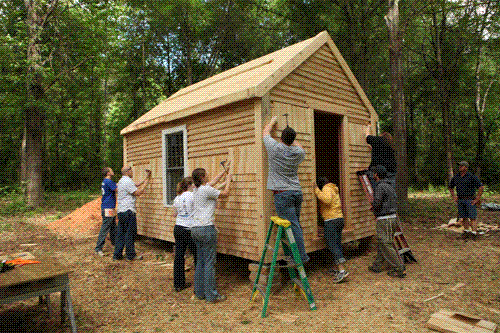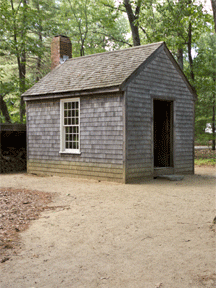Emerson Living 175 Years Later in a Southern Liberal Arts College
By Brandon Inabinet
The roles of education and public intellectualism are at a crossroads, and media technology changes force a sort of “crisis.” Journalism and politics have become a little nastier and more partisan. Schools are being told to become more efficient, technology-bound, and practical. The upswing of stubborn public dogmatisms, partisan attacks on the education, and a general suspicion of elitism recall the Jacksonian era in U.S. history.
In a provocative move, Furman University in Greenville, South Carolina, returned to a different sort of Jackson-era inheritance: Whig ideals, with eloquence in the mode of Ralph Waldo Emerson, nature as a site of learning, a focus on civic debate and conversation, and a rededication to broad, patient learning amidst technological distraction.
The Phi Beta Kappa chapter at Furman University created a new living tradition of Ralph Waldo Emerson’s “American Scholar” lecture this year, the 175th anniversary of that famous speech. The mission, like Emerson’s, is to reimagine the role of learning in American culture, a task that involves not only making the connection between the two, but also arguing for a type of education and a type of culture that might come from such modes of learning.
Emerson’s speech, given to the Harvard Phi Beta Kappa chapter on August 31, in 1837, is typically seen as the most important in American academic history. In it, Emerson called for American academic and literary independence. He asked that “Nature,” not European bookishness, be the measure of their attainments. The focus, he said, would turn away from inherited, insular academic routines toward the active life.
The tradition at Furman, begun last year, is to similarly have a younger scholar deliver a brief lecture on the anniversary of the Emerson speech (at the outset of the academic year). The speakers are well-respected colleagues at Furman University, typically Phi Beta Kappa members themselves, who tie their research and life-status to their persuasive challenge to the students. It is a low cost, highly public way to integrate Phi Beta Kappa into the beginning of the school year.
But the assignment is not to simply pantomime Emerson. In fact, the first speaker, Benjamin Storey, Associate Professor of Political Science at Furman, directly refuted Emerson. He asked Furman students — a group known for taking “engaged learning” to its limits, in service projects, extracurricular groups, internships, research, and other resume-building feats — to be less “busybodies.” Hyperactivity should be curved with old books — books that teach people how to love, how to appreciate beauty, and how to be human as the times change and fads pass by. He also advocated finding abiding friendship to have challenging, intimate conversations. And, contra Emerson, he called for solitude — a retreat from the frenetic world-connecting technologies during the college years: the only years in the students’ lives when the pressures of the world are purposefully placed at a bit of distance.
Hearing such advice from an old Luddite professor or university administrators might be one thing. But to see faculty scarcely a decade older than the students, who walk around directing university programs with tablets, iPods, and snazzy presentation software, making prescient references to Lady Gaga and Alexis de Tocqueville in the same breathe . . . this makes a statement.
This August, in the second year of the lecture series, Bryan Bibb, Associate Professor of Religion, discussed theology and Biblical studies as a liberal arts model. In a school once associated with Baptist pro-slavery advocates and punishing scientists who did not adhere to Biblical standards, Bibb pointed out the importance of close analysis, historical context, and patient thinking in Biblical study. He also argued against disregarding Biblical theology as one local, significant mode of transcendence, despite the current rush in his field to see it merely as one among other cultural histories for analysis.
In both, we hear Emerson echoed: “The mind of this country, taught to aim at low objects, eats upon itself.” Unpopular positions would be the norm for scholars, forecasted Emerson, and those who embraced the life of the mind would endure hostility (even from educated society), uncertainty, and a life at odds with the simple luxuries of fashion, money, and religion. All things, said Bibb, reading Ecclesiastes, are fleeting and vain. Using historically-grounded Biblical interpretation, he called students to chase after fleeting concerns of a certain type — those that could give joy or transcendence in the moment, those that build up others in mutual love and community, and those that allow action out of freedom rather than coercion.
Of course, Furman University is not in the business of creating hermits — far from it. For our campus, though, we would be remiss not to say these things with passion and eloquence to people overburdened by the pressure to find jobs in a bad economy, worried about keeping the same perfect GPA they had in high school, and acculturated toward memorization and test-taking rather than intellectual curiosity and critical thought. It is impossible to blame them, but it is equally impossible to do nothing.
Furman is lucky to have the resources, faculty, and institutional mission to accomplish a push on the continuum toward education of the whole person, intellectual and spiritual. Perhaps the most famous line of Emerson’s address was the challenge to produce bold public eloquence in the service of truth: “The office of the scholar is to cheer, to raise, and to guide men by showing them facts amidst appearances.”
The lecture series has given a huge boost to the energy of the Phi Beta Kappa group on Furman’s campus, with public awareness for a group that inducts mostly seniors in less than a month before their graduation. The Furman chapter decided to name their American Scholar lecture series after Francis Bonner, a former dean who brought Phi Beta Kappa to campus. This was one of his lifetime achievements alongside desegregating the school in the 1960s. Bringing in top faculty and strong study away programs, Bonner accomplished Furman’s first induction in 1974, with Charles Townes, Noble Prize-winning physicist and member of the class of ’35, inducted as its first honorary member.
The students graduating at the university’s induction ceremony each year head out to save the world, signing up to work in the noblest humanitarian organizations, the best law and medical schools, the most prestigious graduate programs and research labs, the best seminaries, and serve out their Fulbright, Marshall, and Mellon scholarships. We are at a turning point in which it might be our additional task to teach them to save themselves: to appreciate the community of a lecture hall, the experience of the oak tree, and the habits of mind outside the most pressing financial burdens — a culture of patient eloquence. We reach a new Emersonian moment.
Brandon Inabinet is an assistant professor of communication studies at Furman University and vice president of the Phi Beta Kappa chapter there. The Gamma of South Carolina chapter was founded at Furman in 1973.
To see the text of the first speech in Furman Magazine, CLICK HERE (PDF).

Top left: Reconstruction of Thoreau’s cabin at Walden Pond. Above: Reconstruction of Thoreau’s cabin at Furman Lake.





